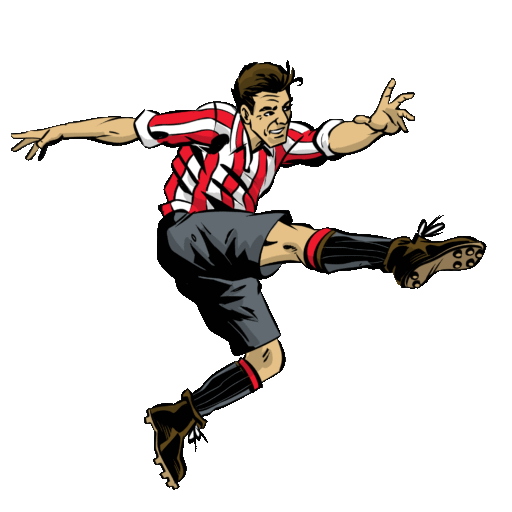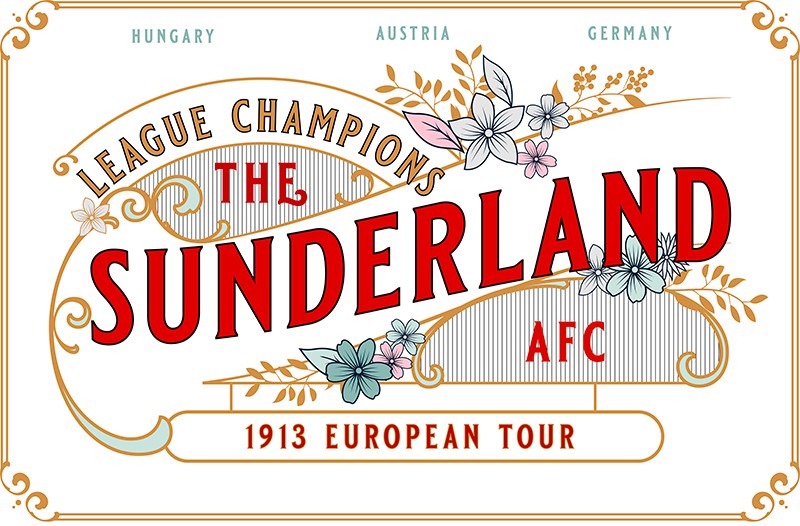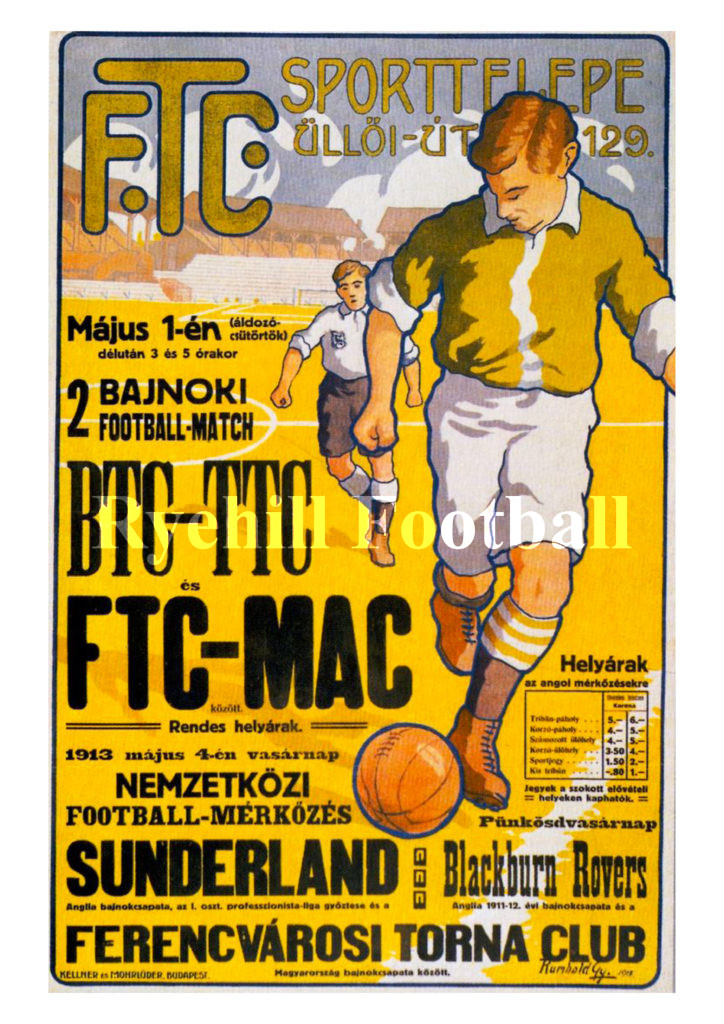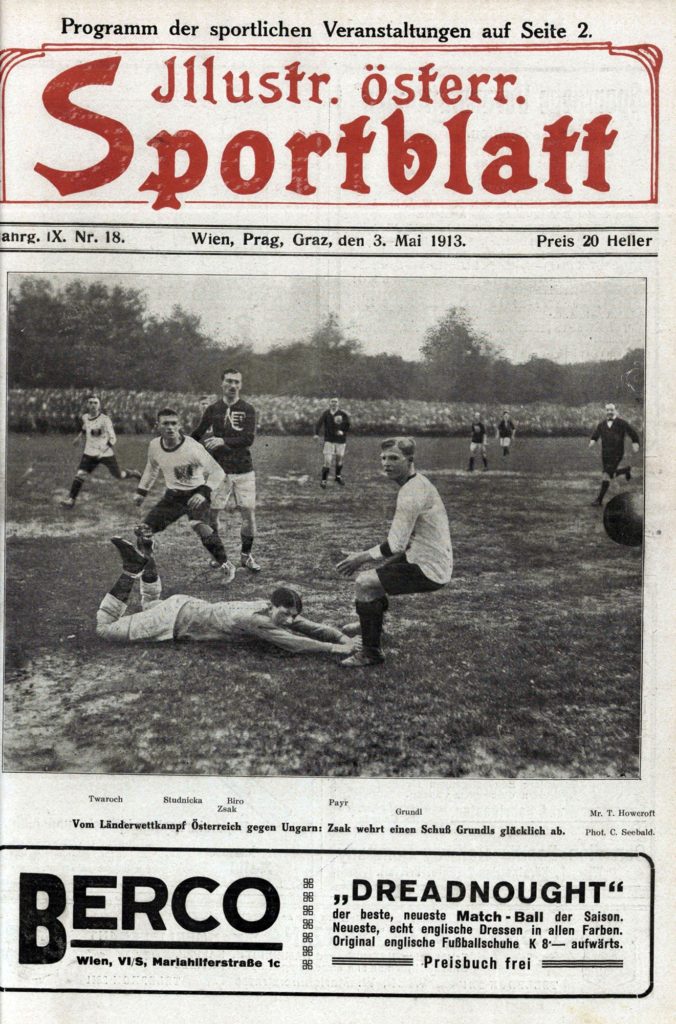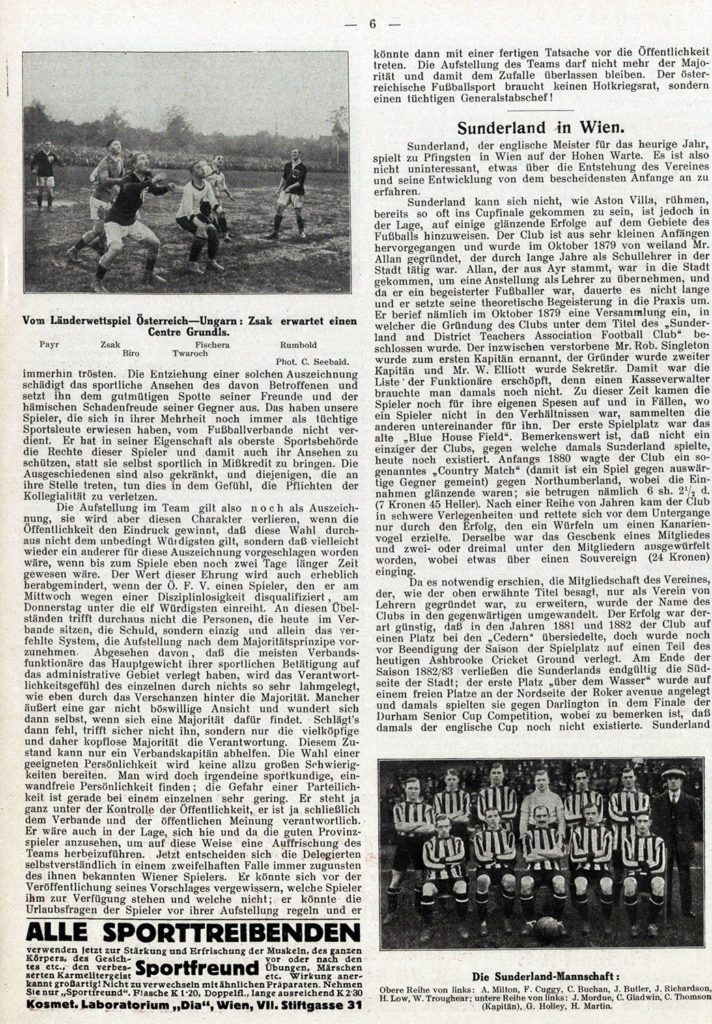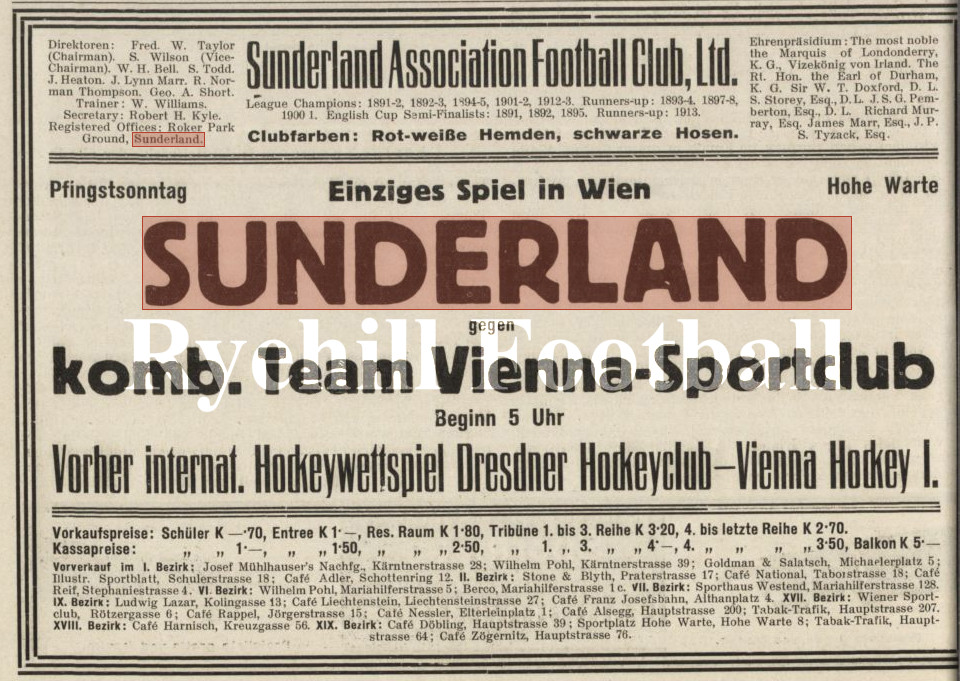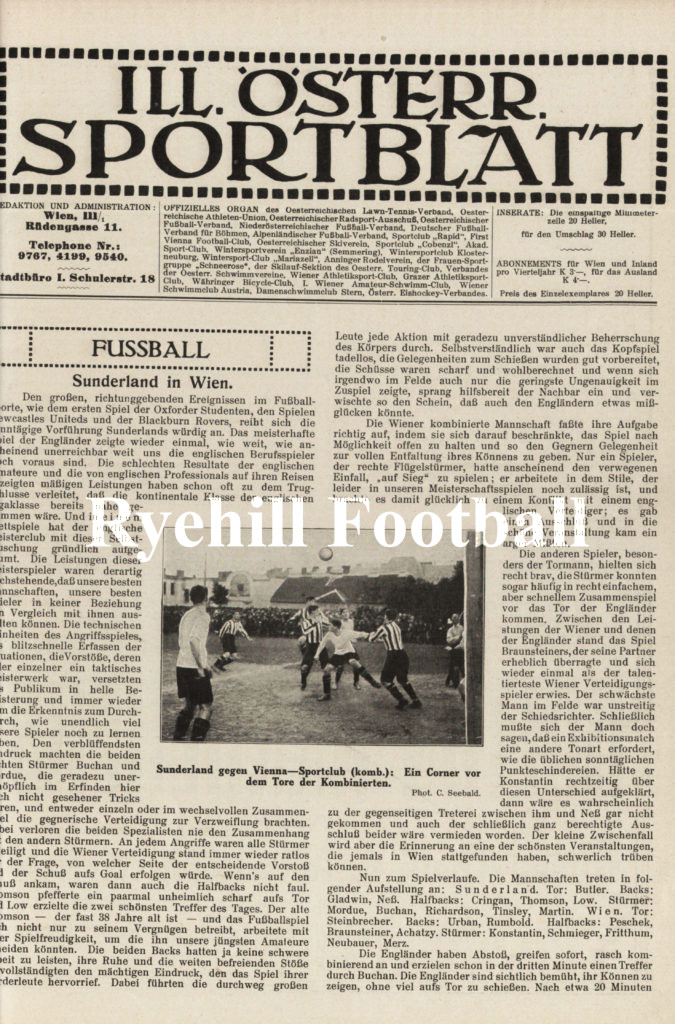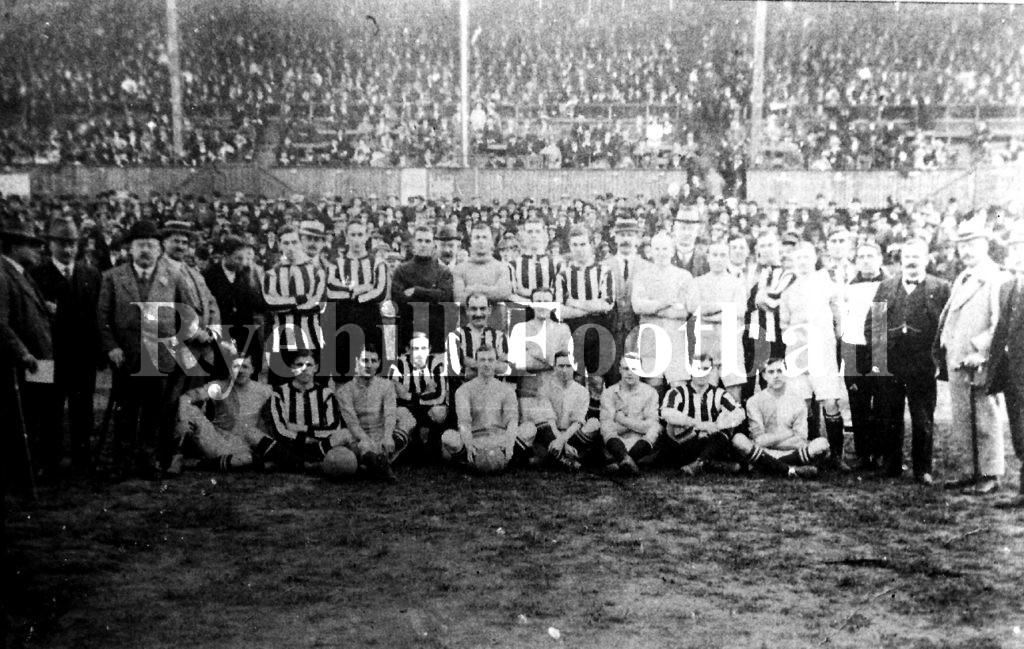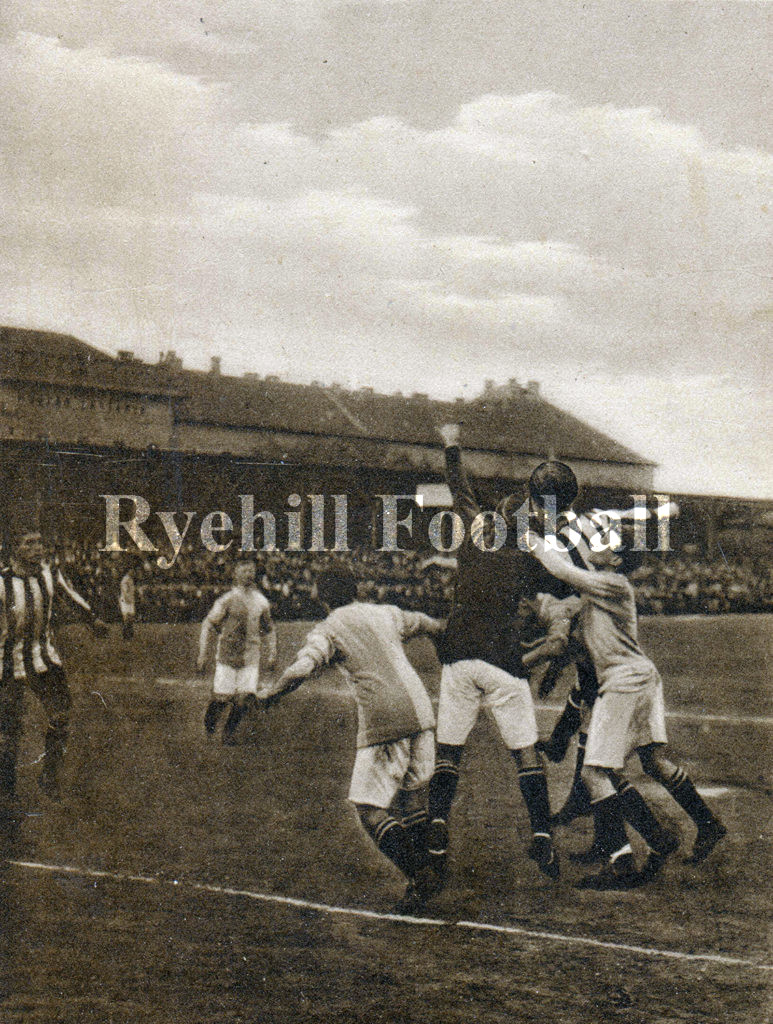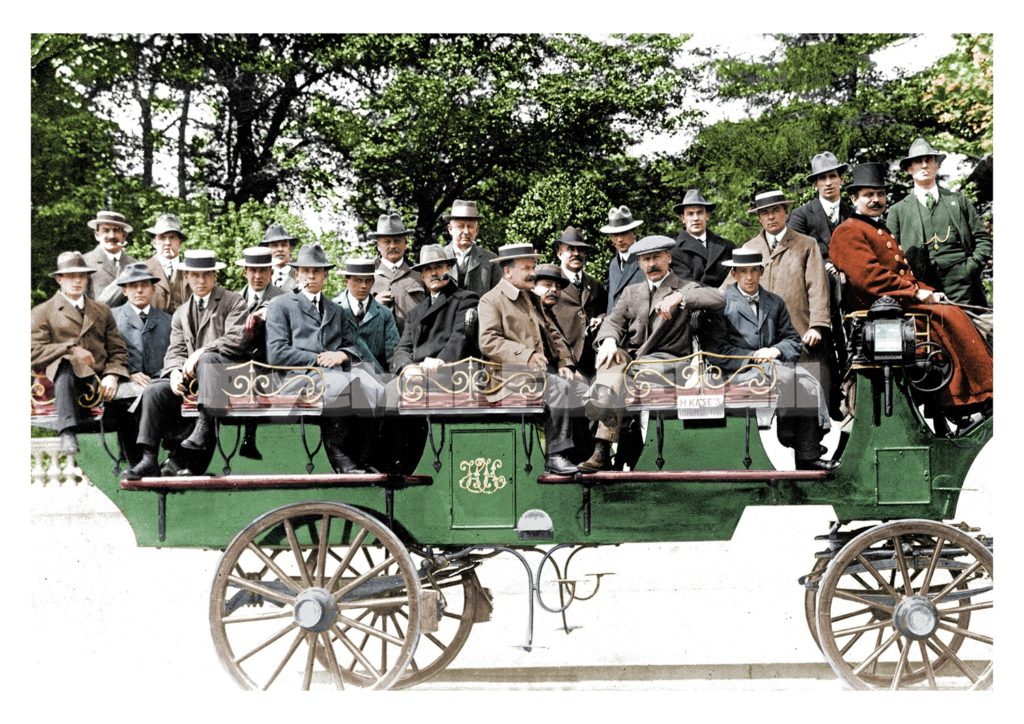The 1912/13 campaign was a successful one that saw Sunderland AFC become league champions for the 5th time, reach the FA Cup Final at The Crystal Palace, where they were narrowly defeated by Aston Villa in front of a worlds record crowd, and at the end of it all the club went on a tour of Central Europe, playing in Hungary, Austria and Germany. Up until now very little has been published on that tour but Ryehill Football can bring football fans, specifically fans of SAFC, the most comprehensive account of that tour ever written. Accompanying this write up are never before seen archive images form the tour, including the local European newspapers.
Interestingly the tour was undertaken with a war looming between the Austro-Hungarian empire and Montenegro, with tensions being ramped up between the two sides. As we now know just 12 months later on 28 June 1914, Gavrilo Princip, a Bosnian Serb Yugoslav nationalist, assassinated the Austro-Hungarian heir Archduke Franz Ferdinand in Sarajevo, leading to the July Crisis. In response, on 23 July, Austria-Hungary issued an ultimatum to Serbia. Serbia’s reply failed to satisfy the Austrians, and the two moved to a war footing.
The Sunderland AFC touring party left the town on 1 May aboard the 9.35am train. In charge was Mr Sam Wilson (vice-chairman), and Mr H. Kyle (secretary). The players who made the journey were:—Goalkeeper, Butler; Backs, Gladwin, Ness, and Hobson; half-backs, Hopkins, Thomson, Low, and Cringan; Forwards, Buchan, Richardson, Holley, Martin, Tinsley, and Best. Milton was among the selected players tor the tour, but he asked to relieved owing to his injured foot still troubling him.
It was reported in the Echo that Buchan, Holley, and Ness had been re-engaged for next season, bringing the list players booked to 19. Cuggy had refused to sign on, although offered the full terms of 4 10s per week. He demanded a benefit match the next season, but this the club declined to grant his wish, given that only completed four years’ service with the club last March. Consequently he was not included in the players that loft for the Continent, although it was hardly likely that he would have gone in any case, as his mother was unwell. Anderson, the Reserves’ custodian, was offered terms re-sign, but refused to accept them. The following was the complete list of Sunderland players signed up for the 1913/14 season: Goal, Butler; backs, Gladwin, Ness, Milton, Hobson, and Troughear; halfbacks, Thomson, Low, Cringan, and Hopkins; forwards, Mordue, Richardson, Buchan. Holley, Conner, Tinsley, Martin. Best, and Coverdale.
The great financial success that attended the club during the 1912/13 season had enabled the directors to tackle seriously the question of enlarging the ground at Roker Park. The improvements had been talked about for a while but a lack funds prevented their dealing with it. Now, however, the work could proceed at once, the contract having been signed with a Liverpool firm on 30 April. The extension would start at the Roker Baths Road end of the field (The Roker End), and the plan for this part the ground, which was adopted the day before, showed that a fine new stand would be erected. The stand was to be of reinforced ferro-concrete, which a combination of concrete, iron and steel, and would extend from the east end of the present shilling stand and round the goal end to the half-crown enclosure. The erection was to follow the line of the Roker Baths Road and was to include the whole of the vacant space between the back of the stand and the street hoarding.
The accommodation of the stands which are to be removed to make way for the new one is about 9,000, and the new stand will hold some 30,000. This increase of 21.000 will make the holding capacity at least 55,000, and that comfortably. The top of the stand to be 46 feet in height, and the front 18 inches below the level of the playing pitch. There was to be 16 entrances and exits, with passages and staircases, as well as numerous crush barriers in ferro-concrete. Indeed, in every respect the stand was to be of a thoroughly up-to-date character, and when finished would equal to the best in the country. The cost of the alteration had not been disclosed, but the Echo understood it to be between £5,000 and £6,000. The work of removing the existing stands was commenced on 1 May, and as soon as the ground is cleared the work of erecting the new stand was to be proceeded with. The work had to be completed for the opening of the next season, under penalty. The Echo informed its readers that the club had been inundated with messages of congratulation winning the League championship. One of the telegrams was from Sunderland Boys in Vancouver, B.C. This consisted of 46 words, and the cost of sending it from Vancouver was 6d per word, “which shows that the boys in that far off land are very enthusiastic over the doings the club”.
Ferencvaros 0 v 9 Sunderland AFC, 4 May 1913, Ulloi Stadion, Budapest
In a letter to the Sunderland Echo, Bob Kyle the Sunderland Manager stated; “ We arrived at (Budapest) on Saturday, and got a wonderful reception, which was repeated when we went on to the ground to play. Really one was delighted. Our lads all played wonderful football, which was duly appreciated, and although the score was 9 v 0 it might easily have been more. I don’t think I exaggerate when I say we should have had three penalties in the first half. The referee’s explanation at halftime was that he did not wish to see Sunderland open the score from a penalty kick! I may say every goal was mightily cheered. The public here like to see goals scored, that is why we got so many. I should say there wore at least 20,000 people present, which speaks well for the club’s popularity. Really I was never prouder of our team than to-day, and while one does not wish to individualise, the play of Mordue and Buchan simply enraptured the public. When near the close George Holley went in for his single-handed efforts he simply brought down the house.’ The goalscorers were: Buchan (2), Holley (1), Morduo (1), Richardson (3), Thomson (1), and Martin (1). The Echo concluded the article by stating that ”the writer mentions also that they are all having pleasant time.
Referee: Ede Herczog, Hungary
Sunderland: Butler, Gladwon, Ness, Cringan, Thomson (70), Low, Mordue (68), Buchan (22 & 83), Richardson (56, 57 & 87), Holley (30), Martin (85)
Ferencvaros: Alajos, Rumbold, Payer, Weinber, Brody, Blum, Weisz, Toth, Pataki, Schlosser, Borbas
On 3 May 1913 the Sportblatt newspaper anticipated Sunderland’s arrival in Vienna where they would play one game and carried an article on the club:
Hungarian Combined XI 3 v 2 Sunderland AFC, Wednesday 7 May 1913, Hungarian Koruti Stadion, Budapest
The second game in the tour was against a Hungarian Combined XI with Sunderland winning by 3 goals to 2. although the original communication back from Central europe was that SAFC has won 4 v 2, later corrected! The Hungarian XI was selected from 4 clubs; The Budapest Torna Club (BTK), Magyar Torna Club (MTK), Budapest Athletic Club (BAK) and Ferencvaros (FTK). The crowd was estimated to be 6000. Joe Lane had previously played for Ferencvaros from 1908 to 1910, before moving to England and playing for Watford. However at the time of this match he was on Sunderland’s books and indeed had played 2 games for the club during the 1912/13 season. He wasn’t mentioned by The Echo as being part of the touring squad therefore we can only guess at his presence and how he ended up playing for the Hungarian Combined side. Lane would leave Sunderland and make a career for himself with Blackpool and Birmingham, before ending his career at Millwall.
Referee: Ede Herczog, Hungary
Sunderland: Butler, Hobson, Ness, Hopkins, Thomson, Cringan, Mordue, Buchan, Richardson (38), Martin (60), Tinsley (7)
Hungarian Combined XI: Ginzery (BTK), Revesz (MTK), Koszegl (BTK), Biro (MTK), Szury (BAK), Blum (FTK), Sebestyen (MTK), Bodnar, Joe Lane (MTK – 20 & 57), Schlosser (FTK), Gallos (BAK).
Vienna XI 0 v 7 Sunderland AFC, Sunday 11 May 1913, Hohe Warte Stadion, Vienna
The Vienna XI was a combination formed from first Vienna and Weiner Sport Club. they were managed by the WSC boss Vince Hayes, a former Manchester United player. Vienna’s Schmeiger missed a penalty in the 42nd minute and Sunderland missed one in the last minute. Harry Ness and Schink were both sent off in the last 10 minutes but the referee reversed his decision and allowed Ness to play on, following protests from his fellow SAFC players. The penalty that Sunderland did score, in the 20th minute, was converted by the goalkeeper Joe Butler.
Referee: Gustav Schmidt (Austria)
Sunderland: Butler (20), Gladwin, Ness, Cringan, Thomson, Low (50 & 79), Mordue (53), Buchan (2), Richardson (63), Martin, Tinsley (39)
Vienna Combined XI: Steinbrecher (FV), Urban (FV), Rumbold (FV), Peschak (FV), Braunsteiner, Achatzy, Schink, Schmeiger, Frithum (FV), Neubauer (sub Sauer 46), Merz
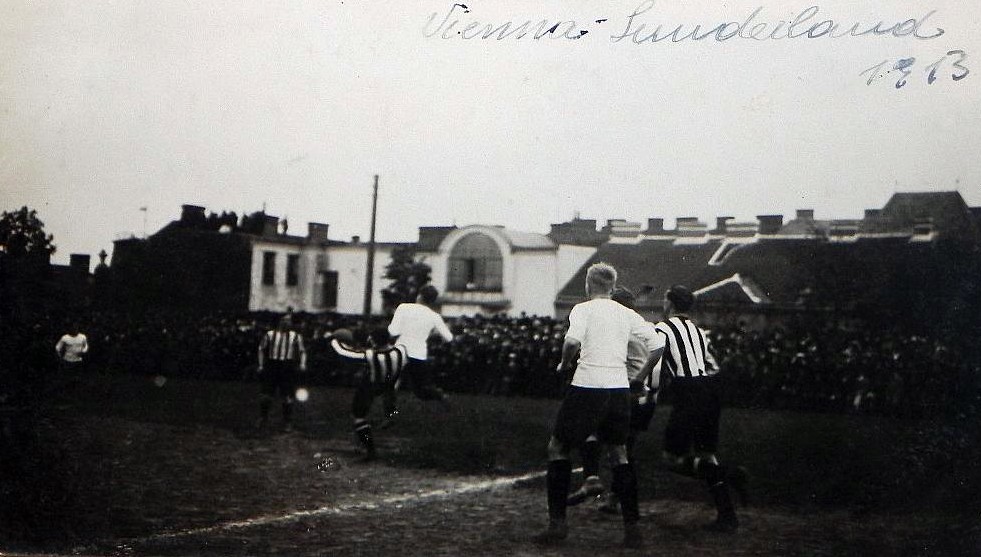
Budapest Athletic Club 1 v 5 Sunderland AFC, Monday 12 May 1913, Petrzalke Stadion, Bratislava (then Pozsony), Hungary (now Slovakia)
DAILY ECHO,- MAY 1913. SUNDERLAND CLUB’S TOUR. A Very Rough Game. LETTER FROM JI. KYLE. “First hand from Mr R. H. Kyle, secretary of the Sunderland Club, we learn that the tour continues to be successful. In the course of his communication the writer states: We won our second game three to two on a very wet evening. Gladwin. Low and Holley were rested. The team was a selected eleven from all the clubs, but our lads again played very fine football. We won at Vienna 7-0, against another selected team, Holley being again absent. The scorers were Buchan, Tinsley, Butler (from a penalty). Low (2), Mordue and Richardson. The team again received an ovation, and I can assure yon that although the ground was like a road in Durham County the lads gave a first class exhibition. The Press commenting on the display stated: “The work of Sunderland was quite up to expectations. They were the best team seen till now in Vienna, and the best in perfection and combination.’’
When in Vienna a chap asked Harry Low what nationality I was and Harry replied Irish.”Oh” replied the inquirer, “he speaks very good English for an Irishman”. Continuing his letter Kyle, says; “on arrival at Pozsony at 9a.m. we were taken to the first-class waiting room, where an address of welcome was read, after which some ladies decorated the party with red and white carnations. They then drove in landaus, each having a little red and white flag flying, to our hotel. Well, the same day we beat an eleven from Budapest by five to one and this was the best team we have so far met.
They literally ran round for the first 15 minutes and scored but failed to stay the pace we had set up. Eventually Buchan equalised. Cringan next scored, Mordue added third from a penalty and Cringan ran through and scored a fourth. In the second half Buchan, after some very clever footwork, scored a fine fifth goal. The game was very rough. The natives to my mind were out for blood, and scarce a man bar the goalkeeper escaped. Cringan played centre and was ordered off the field for retaliating, but after gentle persuasion with the referee was allowed to remain, the referee announcing to the stand people that both players had made it up. I can assure you our players will feel the effects of the knocks for some days, and many them aver no more Continental tours. You see if knock man down people cry “Foul” but on the other hand if our lads go down a regular laugh goes up.
This exhibition match was played in Pozsony then in the Hungarian half of the Austro-Hungarian Empire, but now Bratislava, Slovakia. football was clearly a novelty in the city, played on a makeshift ground of the local gymnastics club. The ground would not become a formal football ground until some years later. The game attracted a large crowd, including one of the Hapsburgs, Archduke Albrecht Franz.
Referee: Gyula Nimsee (Pozsony, Hungary)
Sunderland: Butler, Gladwin, Ness, Cringan (2), Thomson, Low, Mordue (1), Buchan (2), Richardson, Martin, Tinsley
Budapest: Side unknown
The Sunderland and Blackburn Rovers sides pose for a pre match photo in Budapest
Blackburn Rovers 2 v 3 Sunderland AFC, Wednesday 14 May 1913, Ulloi Ut Stadion, Budapest
Sunderland won their fifth game of the tour against Blackburn Rovers, to maintain their unbeaten record, although as expected this was the toughest game of the tour so far. In fact Sunderland had to come from behind to win and were thankful for their devastating strike pairing of Buchan and Holley for the win.
Referee: Mr Street, Manchester, England (Magyar TK Trainer)
Sunderland: Butler, Gladwin, Ness, Cringan, Thomson, Low, Mordue, Buchan (60), Richardson, Martin, Holley (23 & 88)
Blackburn Rovers: Robinson, Cowell, Suttle, Chapman, Smith, Bradshaw, Anthony, Shea (53), Orr, Latheron (29), Hodkinson
Berlin XI 0 v 7 Sunderland AFC, Saturday 17 May 1913, “Plumpe” Stadion, Gesundbrunnen, Berlin (attendance circa 6,000)
In order to record the experience of the tour Sunderland AFC’s Captain Charlie Thomson maintained a diary. Here is an extract from that diary which gives a fascinating insight into the team and officials encounters.
“During our first game of the tour we had 4 penalties refused but the referee allowed play to go on. I went to the referee and asked the reason. He replied “I would not want a great team like Sunderland to score their first goal from a penalty”. The referees controlled the game from the touchline.
During the second game in Budapest we asked the referee to come to the centre of the field but he refused as he said he would get his boots dirty.
For the game v Blackburn Rovers we had a crowd of 16,000 and Mr. Streets of Manchester was the referee who was now coaching in Austria. The Sunderland second goal was scored by Charlie Buchan. It was the best of the tour. George Holley crossed the ball and Buchan met it on the drop, 30 yards out and it went into the net like a rocket. The crowd went mad, but everywhere we scored the crowd loved it. The victory of 3 goals to 2 carried with it a handsome grand statuette bronze figure and costing £25; also a medal for each player worth £2.
The team was lavishly entertained by the Torna club with the Mayor of Budapest being the main guest. Leaving Vienna for Berlin we travelled on the train with Princess Victoria for her marriage to Prince Ernst. On arriving each member received a button hole of red and white carnations and the Broughams (carriages) was decorated with Union Jacks.
We learnt that charging a player in Germany was not allowed when we started our tour of Germany with a game against Berlin XI but they could kick you up in the air. Ordered off was Richardson our centre forward. When leaving the field he remarked “I am glad to be sent off”. Charlie Buchan left the field as he said it was safer in the dressing room.
Harry Low was twice tripped coming off the field after the whistle, people using walking sticks and kicking out at the players and he had to let out at one bloke with a Jack Johnson punch and he was sure he would not forget Sunderland’s visit to Germany. Our reception was very cool and for my point of view the games was a failure in Germany, and anyone going there to play should be fitted out with a suit of armour.
There was one bright moment during the trip. It was when the sole of Harry Low’s boot came off during a game and asking the home trainer if they had a “last” in the dressing room he said that no one used them. Anyway it left Billy Williams our trainer to repair it with 2 stones.
The cost of the tour was between £600 to £700 to be covered by a guarantee”.
Referee: Unknown
Sunderland: Side and scorers unknown
Berlin XI: Side and scorers unknown, although we do know that the side was a combination of the BFC Hertha 92 (now Hertha Berlin) side and Berliner Sports Club
The Sunderland AFC touring party enjoy the sights and sounds of Central Europe on their end of season tour
Hamburg XI 0 v 5 Sunderland AFC, Sunday 18 May 1913, Höhenluft Stadion, Hamburg (attendance circa 6,000)
The Hamburg side was a combination of players from Altonaer FC and Elmsbutteler Tunverband teams from two districts of Hamburg that still play today in Germany’s lower leagues. the game was very rough with the Hamburg players unhappy with the Sunderland players “shoulder charging” and in particular the treatment of Jaeger. Sunderland were just as unhappy with the Germans “kicking anything that moved” and Richardson was quoted afterwards (see Charlie Thomson account above) as saying that he was pleased to have been sent off for retaliation in the last 10 minutes. Reports indicate that a second Sunderland player was sent off but this could be mixed up with Charlie Buchan, who decided to walk off the pitch rather than be kicked any more. Umbrellas were used to protect the Sunderland players as they left the field after the game as objects were thrown at them.
Referee: Unknown
Sunderland: Side and scorers unknown
Hamburg: Side and scorers unknown
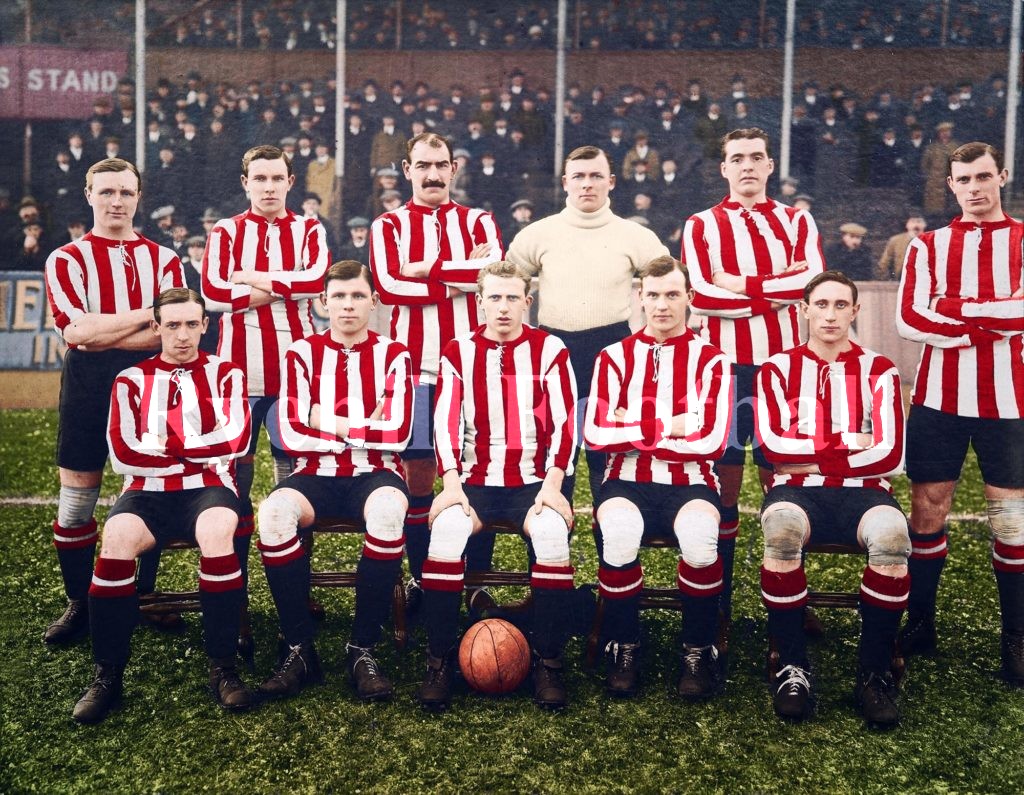
The Sunderland F.C. players and officials arrived in London the following Saturday morning from their Continental tour, and then separated for their respective Domes. Only seven of the players came to Sunderland, which was reached about 4.30 in the afternoon, and these were Thomson, Low, Richardson, Buchan, Cringan, Best, and Holley, and the trainer, Billy Williams. Cringan and Best afterwards proceeded to their homes, leaving less than half-a-dozen in the town, until the training time comes round again.
Bob Kyle remained in Lon don for the purpose of attending the annual meeting the Football League. The Echo representative had an interesting conversation with Thomson, Low, and Richardson on the subject of their tour, and they each spoke in glowing terms of the trip. Charlie Thomson, the captain, had the idea of keeping a diary of the tour (see above) and stuck manfully to the self-imposed task until reaching Dover and then, alas, the book was commandeered for bridge scoring purposes.
In the course of a chat Thomson said that the party were in charge of Mr Turnham, of the Great Northern Railway Company, and the arrangements throughout were excellent, adding: “We were only 20 minutes later than the scheduled time from leaving Sunderland reaching Budapest, and that was through taking another train.” ’The first match at Budapest,” he continued, was with the Fereueznarosi Torna Club, and the team had a great reception on the ground from about 30,000 spectators. I think they have improved in their style of play both in Hungary and Austra since we were there four years ago. They have certainly a better idea of the game.
Football on the Continent, however, would very much improved if they had better referees; they are the drawback. In each match the referee controlled the game from the touch-line, instead following the play in the middle of the field.” “During the first match we had no fewer than four penalties in the first ten minutes, but the referee refused to allow them. When asked for the reason he replied: I would not like to see a great team like Sunderland score their first goal from a penalty kick.’ What did you say to that?” queried the reporter.”—”Well, what could I say?” The reporter having expressed the opinion that it was a very nice compliment to Sunderland, the interview proceeded.
In the second match, against the Magyar team at Budapest, I asked the referee to come into the centre of the field, but he refused and gave as his reason—in broken English—that he did not want to dirty his boots.” Touching upon the third match, which was with the Blackburn Rovers, Mr Streets, late of Manchester, acted referee. Mr Streets is present staying at Budapest coaching a team. This was the pleasantest game ot the tour, there being scarcely any fouls. There would be about 16,000 spectators, and they were most enthusiastic, applauding every bit fine play. “We won,” continued Thomson, “by three to two, Holley scoring the first and third, and Buchan the second. The goal scored by Buchan was one of the finest I have ever seen. Holley centred the ball, and Buchan met it about 30 yards out. The ball came across about a yard high, and Buchan meeting it with his foot drove it into the net. The crowd nearly went mad with delight, and the goalkeeper never saw the ball until it was in the net.
Wherever we went the spectators liked to see goals scored against their own team, and the more we scored the better they liked us.” A curious incident,” he proceeded, “occurred during the match. After the half-time the referee blew his whistle for the game to be restarted in the usual way. Just after the start a young woman rushed on to the field and went to Butler for his autograph. While Butler was writing his name in a book the referee stopped the play, I don’t know whether the Rovers had protested against us having an extra one in goal, but the referee stopped the game, and ordered it to be restarted after the lady had come off. The victory carried with it a handsome bronze figure representing a victorious athlete, and costing about £25 also set of medals worth about £2 each. The statuette has been brought home and will be hauded over to the chairman.”
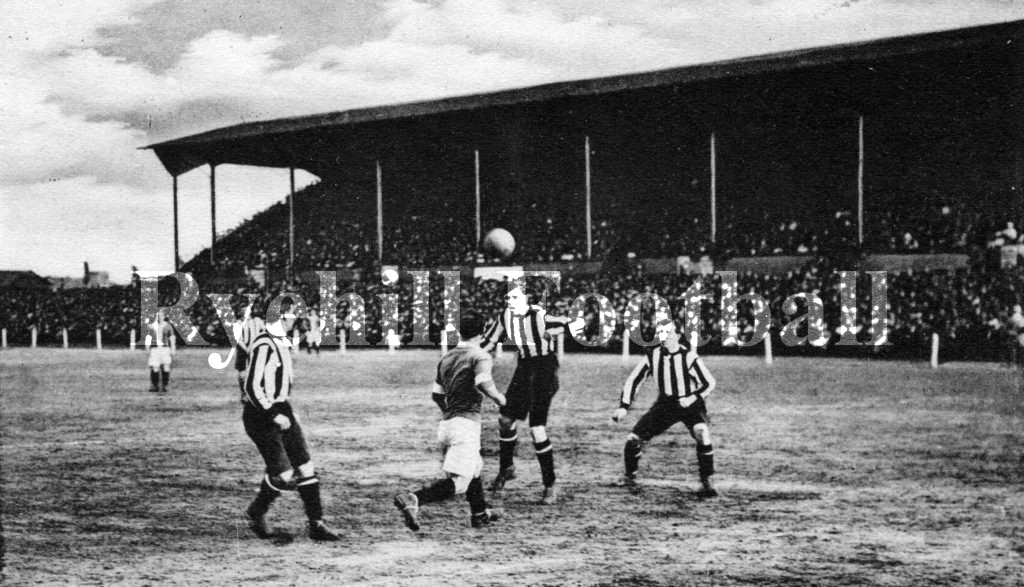
The captain mentioned that he was introduced to the Lord Mayor of Budapest and the party were also lavishly entertained by the Torna Club. On arrival at Pozsony the president of the Pozsony Club met the Wearsiders at the station and read them an address of welcome. Each member of the party also received a button-hole of red and white carnations from some ladies, and broughams, decorated with the Union Jack, were placed at the disposal of the players and officials take them the hotel and the ground.
After leaving Hungary and Austria, Germany was visited, and about the football in the latter country none of the players speak well. As Thomson put it: *’ln Germany charging is not allowed, but they can kick you up into the air and bite you when you are coming down; that is German football. Every time our boys gave a good English charge we were ordered off, but we didn’t go. Our victories at Berlin he continued had gone on to Hamburg before us, and our reception there was very cool.
From a football point of view the game was failure, and the next English team that goes to Hamburg ought to fitted up with armour suits.” What about the ordering off of players in the Hamburg match? Thomson: “Well, Richardson was ordered off and he went off (Richardson: And glad to get off.) —and Buchan walked of because thought he would be safer in the dressing-room than on the battle-field.” Harry Low remarked; “It was a battlefield and mistake!” We had a rough time of it coming off the field,” said Thomson, people trying to trip us up with walking-sticks and kicking at us. One chap tripped Low twice, and Low let out with a Jack Johnson punch, and that man won’t forget the day Sunderland played at Hamburg in a hurry.”
Low appeared to be tickled at the reference to the Jack Johnson punch, and even admitted having hit the man, but apologetically added : He asked for it! When in Berlin, the party came across Mr Hanselman, a Wearside resident, and they also saw a number of Britishers in that city—a city the players could not speak too highly of. They had four clear days in the German capital, and during that time visited all its principal places. They spent a whole day at Potsdam, the summer residence the Kaiser, and greatly enjoyed it. When travelling from Vienna to Berlin the Wearsiders were in the same train that conveyed Princess Victoria to Berlin for her marriage with Prince Ernst on Saturday.
They also visited the cathedral where the wedding took place. They further had the satisfaction of loyally greeting King George and Queen Mary in the streets of Berlin. Richardson observed: “They must have thought there were thousands by the noise we made.”
When at Berlin, Mr Turnham was presented with a snakeskin cigar case and a silver-mounted holder, suitably inscribed, as a mark of appreciation of his kindness and courtesy. Harry Low mentioned that during the match in Hamburg the sole one of his boots was kicked off. He asked the home trainer if there was a “last” handy so as to get the boot repaired, but they bad not such a thing about the place. However, Trainer Williams rose to the occasion, and with the aid a couple of stones managed to repair the boot, and so enable the player to finish the game. Richardson was quite content to endorse the sentiments of the previous speakers.” Referring the rough treatment at Hamburg, he remarked: I got half my coat torn off when leaving the ground, but cost the man that did it something.” The party then broke up, and there will be little more heard of the players until the call for the practices is made.
